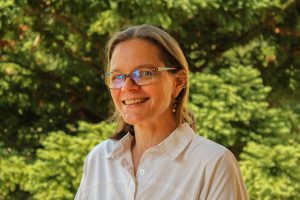2023-24 Faculty Fellows: Get to Know Them and Their Courses
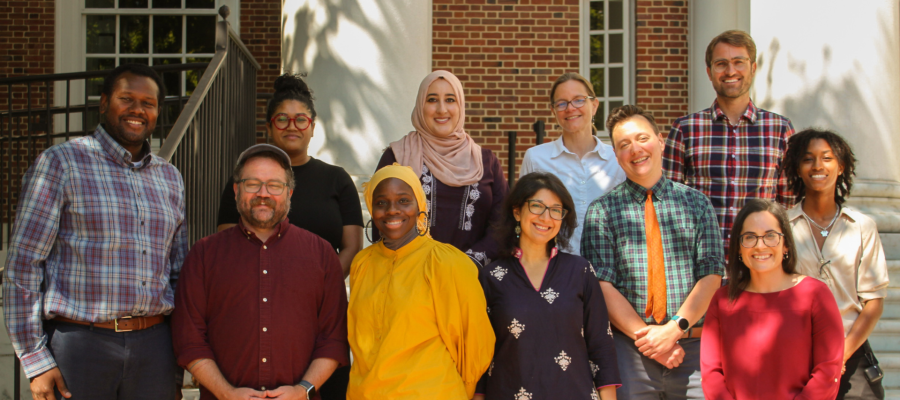
by: Sierra Romero
In partnership with Hopkins faculty, the Center for Social Concern will be offering 10 community-based courses (CBL) this upcoming spring semester. Community-Based Learning is a pedagogical model that engages students, faculty, and Baltimore City Co-Educators (Community Partners, e.g. nonprofit and government agencies) in coursework and community engagement that supports academic learning objectives and Community Co-Educator identified needs.
The 10 faculty members are fellows in the Engaged Scholar Faculty & Community Partner Fellows Program, a cohort-based program housed at the Center for Social Concern (CSC), that facilitates the development and implementation of mutually beneficial Community-Based Learning courses.
Get to know our faculty fellows and their courses below.
Nadejda Webb
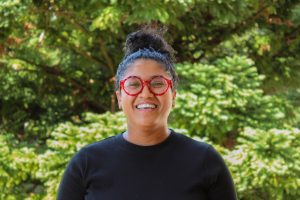 ACLS PostDoctoral Fellow, Center for Digital Humanities
ACLS PostDoctoral Fellow, Center for Digital Humanities
Nadejda I. Webb (she/her/they) is currently an ACLS Emerging Voices Postdoctoral Fellow in Black Digital Humanities at the Johns Hopkins University, where her teaching and research interests include 20th and 21st-century African-American and Post-Colonial literature and digital humanities, imaginaries, and belonging.
Black Women Artists, Social Change and Baltimore
This course introduces students to a history of social change within Baltimore centered on Black women artists. Students will learn and apply archival and oral history methods as they engage local movements and collect archival information. This course will be taught in partnership with Sharayna Christmas, artist, filmmaker, cultural worker, and founding Director of Muse 360 (est. 2004), a Baltimore-based organization dedicated to developing the next generation of thinkers, artists and activists rooted in Black Diasporic History.
Daniel Cumming
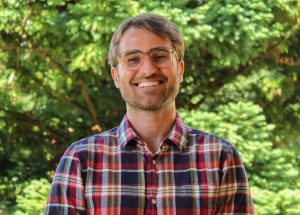 PostDoctoral Fellow, Program in Racism, Immigration and Citizenship
PostDoctoral Fellow, Program in Racism, Immigration and Citizenship
Daniel Cumming is a historian of the 20th-century U.S. and a postdoctoral fellow with the Program in Racism, Immigration, and Citizenship at Johns Hopkins University. His scholarship explores the intersections of housing policy, public health, environmental justice, racial capitalism, and metropolitan history.
Nothing About Us Without Us: Storytelling as a Method for Community Organizing
This course offers a hands-on opportunity for students to develop new skills as community organizers by learning from the best teachers possible: residents who have been serving their neighborhoods and building grassroots power in Southwest Baltimore since the 1990s. Students will partner on community projects identified by Fayette Street Outreach (more information slide 8).
Nusaybah Abu-Mulaweh
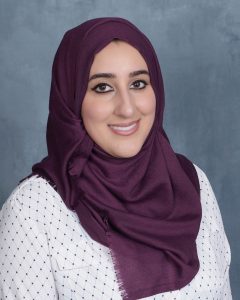 Lecturer, Center for Leadership Education
Lecturer, Center for Leadership Education
Dr. Nusaybah Abu-Mulaweh is a faculty member in the Multidisciplinary Design Program within the Center for Leadership Education at Johns Hopkins. She teaches design courses that apply a human-centered approach that focuses on grounding designs in the needs of users throughout the entire design process.
Social Impact Design
In this course, multidisciplinary teams of students will collaborate with a Baltimore community partner to tackle a design challenge that addresses an issue of injustice. In collaboration with J.C. and the Bmore Community Food group, student teams will be challenged to design and build a seamless food distribution device and system that can offer sustenance to individuals at any hour (learn more on slide 7).
Lisa Wright
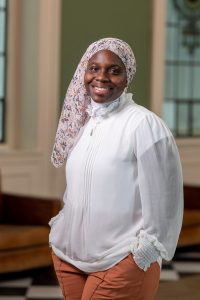 Lecturer, University Writing Program
Lecturer, University Writing Program
Lisa E. Wright is a Lecturer in the University Writing Program. Her research interests and courses center on Black maternal health, with a particular focus on Black midwives.
Reproductive Justice in Baltimore
In 1994, 12 Black women coined the term Reproductive Justice. Its tenets are 1) the right to have children; 2) the right not to have children; and 3) the right to parent children in safe and healthy environments, free from violence by individuals or the state. Students will write in various genres with varying audiences in the Black maternal health field. This course will culminate with a community gathering that celebrates Black Maternal Health Week where students will have opportunities to listen to members of the Reproductive Justice community and present their research to an audience of their peers.
Homayra Ziad
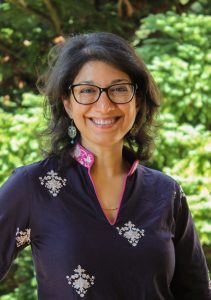 Director, Program in Islamic Studies
Director, Program in Islamic Studies
Homayra Ziad is a scholar-activist, educator and writer, and Director of the Program in Islamic Studies at Johns Hopkins University. She spearheaded education on Islam and engagement with Muslim communities at an interfaith educational non-profit in Baltimore where she helped teachers, activists and emerging religious leaders explore the intersections of religion and social justice.
Museums, Communities, and the Sacred
This course is co-created by a scholar and curator with expertise in religion, art, and material culture, and taught in partnership with the Baltimore Museum of Art (BMA), and centers how museums engage with the sacred. Recognizing that museums have traditionally been underequipped to respond to the social concerns that animate their local communities, the BMA is rethinking how a twenty-first century civic museum engaged the city in which it is located.
Anne-Elizabeth Brodsky
Anne-Elizabeth Brodsky teaches in the University Writing Program, where her courses center on American education, race, literature, and friendship. She is co-founder and faculty director of the Common Question.
Reintroduction to Writing: Music, School, & Democracy
Students will work with and learn from the Baltimore Symphony Orchestra OrchKids program and Arts Every Day, an advocacy organization. With these co-teachers, alongside mentors from the Center for Social Concern, we will explore El Sistema pedagogy, the assets of City Schools, and systemic racism and inequity in Baltimore. Throughout, we will discuss and rehearse writing as an intellectual, social, and always emerging practice. No artistic background needed; all are welcome.
Matthew Pavesich
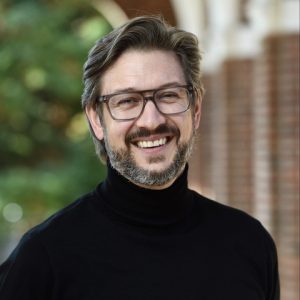 Director and Teaching Professor, University Writing Program
Director and Teaching Professor, University Writing Program
Matthew Pavesich is Director and Teaching Professor of the University Writing Program. He specializes in writing and rhetoric, pedagogy, and the public humanities.
The City That Writes
In 1988, Baltimore’s first African-American mayor, Kurt Schmoke, declared Baltimore the “city that reads.” In this course, we’ll explore the ways that Baltimore has always been a city that writes, too. In partnership with Wide Angle Youth Media, we’ll study how writing fuels the work of the organization, interacts with the residents of Baltimore, and knits together social life in this great city. Students can expect to write both traditional academic essays and in other forms such as presentations, proposals, case studies, social media campaigns, and more.
Morris Speller
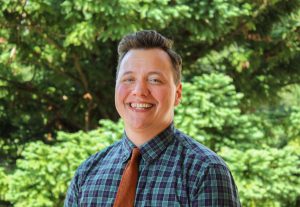 Lecturer, University Writing Program
Lecturer, University Writing Program
Morris “Mo” Speller teaches in the University Writing Program. His writing courses encourage students to think about how the past informs present-day life in Baltimore.
Reintroduction to Writing: Lost Baltimore
In this community-engaged writing course, students will work closely with the Baltimore City Archives to uncover the stories of people who lived in neighborhoods demolished by the Housing Authority of Baltimore City between the 1930s and 1960s. We will examine documents that the Housing Authority generated while acquiring homes for demolition— photographs, appraisal forms, court affidavits, and more—to consider the way these forms of writing impacted the lives of Baltimoreans facing displacement. The course culminates with a collaboration with local archives and museums: students will research and create texts for a public exhibit on the history of Baltimore neighborhoods that have been lost to urban renewal, gentrification, and other forms of displacement.
Thomas Cudjoe
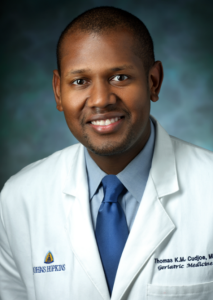 Assistant Professor of Medicine
Assistant Professor of Medicine
Thomas K.M. Cudjoe, M.D., M.P.H., M.A. is the Robert and Jane Meyerhoff Endowed Professor, Assistant Professor of Geriatric Medicine and Gerontology at the Johns Hopkins School of Medicine. He leverages community-based strategies, mixed-methods and human centered design to understand and address social isolation.
Designing the Future: Health and Aging
This course is developed for students with a multidisciplinary and/or public health background and interest who are eager to learn new approaches that can be applied in a variety of settings. Students will be introduced to an overview of the public health impact of an aging society as well as design frameworks and methods (i.e. human centered design, co-design, social design) that can be applied to deal with complex problems impacting health and aging.
Nate Brown
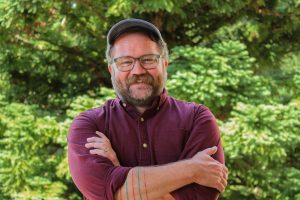 Senior Lecturer, University Writing Program
Senior Lecturer, University Writing Program
Nate Brown is a writer and editor who holds a BA in English from Cornell University (2004) and an MFA in fiction from the University of Wisconsin-Madison (2008). His areas of interest and research include equity and access in literary publishing, visual rhetoric and writing about art, community-based learning, and sustainability in the nonprofit arts space.
Build, Borrow, Repair: Writing With the Station North Tool Library
In this collaborative, community-based learning course, students will work directly with the staff and volunteers of the Station North Tool Library, Baltimore’s decade-old tool-lending library. Together, we’ll seek to learn more about libraries of things as we study Baltimore’s housing ecosystem and related development and zoning policies. We’ll also work to understand how libraries of things and makerspaces across the country aim to empower individuals to undertake building and maintenance projects of their own. Students will engage in qualitative research, perform interviews with and write profiles about various constituents and stakeholders at the SNTL, and seek to understand how community organizations like the Tool Library are founded, funded, and sustained over time.
Registration for the Spring 2024 semester is now open on SIS. Sign up for a course today!

